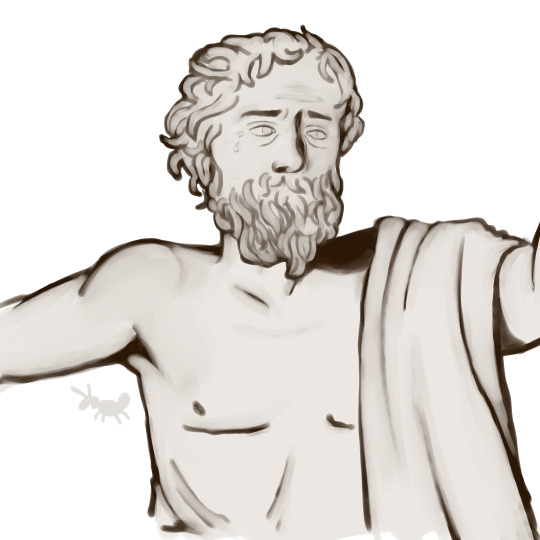#the death of socrates
Explore tagged Tumblr posts
Text
“The Death of Stanford”

#fanart#ford pines#gravity falls#stanford pines#bill cipher#art#fiddauthor#fiddleford mcgucket#stanley pines#based on one of my favorite paintings#the death of socrates#god it fits so well#I’m so proud of this piece
62 notes
·
View notes
Text

The Death of Socrates (1787) 🎨 Jacques Louis David 🏛️ The Metropolitan Museum of Art 📍 New York City, United States
In this landmark of neoclassical painting from just before the French Revolution, David took up a classical story of resisting unjust authority in a sparse, frieze-like composition. The Greek philosopher Socrates (469–399 BCE) was convicted of impiety by the Athenian courts; rather than renounce his beliefs, he died willingly, expounding on the immortality of the soul before drinking poisonous hemlock. Through a network of gestures and expressions, David’s figures act out the last moments of Socrates’s life. He is about to grasp the cup of hemlock, offered by a disciple who cannot bear to witness the event. David consulted antiquarian scholars to create an archeologically exacting image, including details of furniture and clothing. His inclusion of Plato at the foot of the bed, however, deliberately references not someone present at Socrates’s death but rather the author whose text, Phaedo, preserved this ancient story.
#The Death of Socrates#1787#Jacques Louis David#The Metropolitan Museum of Art#The Met#New York City#United States#french#painting#oil painting#oil on canvas#Neoclassicism#Academic art#La Mort de Socrate#art#artwork#art history
34 notes
·
View notes
Text

19 notes
·
View notes
Text

the death of socrates by jacques-louis david (1787)
8 notes
·
View notes
Text

Jacques Louis David (French, 1748-1825) The Death of Socrates, Details, 1787 The Metropolitan Museum of Art
#Jacques Louis David#french#french art#france#the death of socrates#1700s#fine art#fine arts#classical art#art#european art#europe#european#oil painting#europa#mediterranean#socrates#southern europe#cradle of civilization#western civilization
35 notes
·
View notes
Text

THE DEATH OF SOCRATES, 1787 by JACQUES-LOUIS DAVID
Another story of stoic sacrifice and dignity, DAVID portrayed SOCRATES’ suicide as an act of courage and nobility. Set in the secluded cell of his jail, the aging philosopher’s muscular body is intended to represent his moral and intellectual health.
He sits up straight, prepares to take the bowl of poison hemlock; he would die rather than give up his lessons; his hand is raised in a gesture of oratory, lecturing till the last moment while his students show a variety of emotions at his execution.
DAVID’s painting is based on PLATO’s description of the event, which ties DAVID’s painting to a classical source; however, as in the case of THE OATH OF THE HORATII, DAVID manipulates the scene for dramatic effect. He removes some of the characters mentioned in PLATO’s account, and idealizes the aging figure of SOCRATES, conveying his message of heroic rationality and intellectualism to the viewer.
#the death of socrates#jacques louis david#neoclassicism#neoclassical art#neoclassical#neo classical painting
5 notes
·
View notes
Text

This is how it felt when Abigail ( @theabigailthorn )talked about the Chanel after her 😭
#philosophy tube#abigail thorn#fanart#philosophy tube fanart#digital art#art#digital drawing#drawing#the death of socrates
1 note
·
View note
Text
youtube
The Death of Socrates (399 BC) Ambient Music
#socrates#the death of socrates#philosophy#stoicism#marcus aurelius#plato#philosophy quotes#wisdom#nietzche#philosopher#epictetus#aristoteles#seneca#friedrich nietzsche#frederick nietzsche#existentialism#psychology#voltaire#schopenauer#arthur schopenhauer#alan watts#absurdism#charles bukowski#genio#genious#Youtube
1 note
·
View note
Text

في هذا العمل المحوري الكلاسيكي، والذي تم رسمه قبل بداية الثورة الفرنسية مباشرة، يغوص جاك لويس دافيد في رواية كلاسيكية متمركزة حول مقاومة السلطة الظالمة، في تكوين تقليلي يشبه الإفريز. إن موضوع اللوحة هو الفيلسوف اليوناني سقراط (٤٦٩-٣٩٩ ق.م)، الذي تم إتهامه بالكفر من قبل المحكمة الأثينية. بدلاً من أن يضحي بقناعاته، اختار سقراط ملاقاة مصيره طواعيةً، شارحاً نظرية خلود النفس قبل أن يتجرع الشوكران السام. بواسطة شبكة من الإيما��ات والتعبيرات، تُصَور فنيات دافيد بشكل واضح آخر اللحظات في حياة سقراط. تم تصوير الفيلسوف على شفا تناول شراب الشوكران، يقدمه له أحد مريديه الذي لا يتحمل مشاهدة الحدث. في بحثه عن الواقعية، استشار ديفيد خبراء الآثار لإعادة تكوين التفاصيل الأثرية بدقة، حتى الأثاث والملابس المتعلقة بالزمن. ضمَّن ديفيد بشكل ملحوظ شخصية أفلاطون على طرف السرير، في إشارة مقصودة إلى كاتب فايدو، وهو النص الذي حفظ هذه القصة العتيقة، على الرغم من أن أفلاطون لم يكن موجوداً بشخصه خلال آخر اللحظات في حياة سقراط.
إنها كلاسيكية!
The Death of Socrates
Jacques-Louis David
1787
0 notes
Text
how it feels to talk about Luke, Thalia, and Annabeth's broken family, it's role in the Great Prophecy, and it's influence on the core emotional arc of pjo itself:

#the death of socrates is intentional here im annoying enough about it for people to want to kill me#but those who get it GET IT#pjo#percy jackson#annabeth chase#thalia grace#luke castellan#the broken trio
158 notes
·
View notes
Text

"Death may be the greatest of all human blessings." - Socrates
41 notes
·
View notes
Text

The death of Stanford Wip
#fanart#ford pines#gravity falls#stanford pines#stanley pines#fiddleford mcgucket#fiddauthor#digtial art#I love the death of Socrates so much#what is ford if not a foolish but proud thinker#this is going to take forever#art wip#current wip#mystery trio
52 notes
·
View notes
Text

Socrates? Who even is that?
30 notes
·
View notes
Text
Be of good cheer about death and know this as a truth, that no evil can happen to a good man, either in life or after death - Socrates
#socrates#death#energy#attunement#no fear#passing on#karma#cause and effect#hereafter#eternal life#soul path#character#personality#evolution#awareness#choices#love
5 notes
·
View notes
Text

Socrates, 2016-2024.
5 notes
·
View notes
Text


Jacques-Louis David (FR, 1748 - 1825)
The Death of Socrates (details), 1787. Oil on canvas 129.5 × 196.2 cm (51.0 × 77.2 in). The MET
The Greek philosopher Socrates (469–399 BCE) condemned to death by the people of Athens, prepares to drink a cup of hemlock, surrounded by woebegone friends. In the spring of 399 BC, three Athenian citizens had brought legal proceedings against the philosopher. They had accused him of failing to worship the city's gods, of introducing religious novelties and of corrupting the young men of Athens - and such was the severity of their charges, they had called for the death penalty.
Socrates had responded with legendary equanimity. Though afforded an opportunity to renounce his philosophy in court, he had sided with what he believed to be true rather than what he knew would be popular. In Plato's account he had defiantly told the jury:
So long as I draw breath and have my faculties, I shall never stop practicing philosophy and exhorting you and elucidating the truth for everyone that I meet ... And so gentlemen ... whether you acquit me or not, you know that I am not going to alter my conduct, not even if I have to die a hundred deaths.
And so he had been led to meet his end in an Athenian jail, his death marking a defining moment in the history of philosophy....
If the [picture - David's painting] struck me so forcefully, it was perhaps because the behavior it depicted contrasted so sharply with my own. In conversations, my priority was to be liked, rather than to speak the truth... I sought the approval of figures of authority and after encounters with them, worried at length whether they had thought me acceptable. When passing through customs or driving alongside police cars, I harbored a confused wish for the uniformed officials to think well of me.
Excerpt from The Consolations of Philosophy, by Alain de Botton, NY: Vintage. 2000, p. 3
https://www.metmuseum.org/art/collection/search/436105
https://www.faculty.umb.edu/michael_lafargue/104/204/plato/readings/debotton-sht-12-05.htm
#Jacques-Louis David#painting#classic#Socrates#death#poison#hemlock#Alain de Botton#philosophy#iconic
5 notes
·
View notes